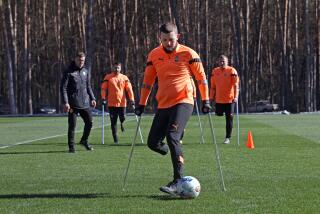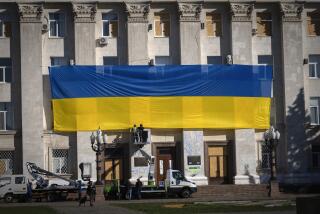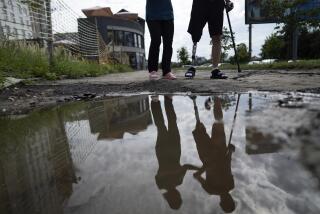Bosnian’s High Spirits Prevail Over Injuries : Treatment: He awaits surgery to restore his voice and prepare him for artificial legs in Los Alamitos.
- Share via
LOS ALAMITOS — Nothing can wipe the broad smile from Suad Krso’s face. Not the loss of his legs to a grenade blast in his hometown of war-torn Sarajevo, nor the shrapnel it left embedded in his chest. Not even the plastic tube in his windpipe that gushes and hisses when he tries to speak.
“I have a strong spirit and heart,” the 40-year-old Bosnian said Wednesday through an interpreter, who was among a group of well-wishers from Southern California’s Bosnian community visiting Krso’s bedside at the Los Alamitos Medical Center.
Krso lifted his right arm high and clenched his biceps to symbolize the strength of his spirit and reflect the determination of his fighting countrymen.
The visitors included Meho Rucic, 42, a fellow Bosnian who, like Krso, was among 19 people evacuated from Sarajevo last week and airlifted to the United States for treatment from doctors and hospitals volunteering their facilities and expertise. Two Bosnians are hospitalized in Orange County.
Rucic, a soldier whose right eye was partially blinded by a grenade, is being treated at Century City Hospital in Los Angeles. He and Zahid Sulejmanagic, treasurer of the Bosnia Relief Fund, presented Krso with a picture of the national flag of Bosnia-Herzegovina, which Krso reverently kissed.
“There is no other country for me,” Krso said.
Krso has come halfway around the world to Los Alamitos Medical Center, hoping that doctors can perform surgery to restore his voice and prepare the stumps of his legs for artificial limbs. These procedures will be performed Wednesday.
“Everything is just perfect here,” said Krso, who has been watching television, sipping orange juice and writing postcards since his arrival at the hospital Saturday.
“I have everything here except my family,” he said, gesturing toward the collection of family pictures he keeps within sight on his bed tray.
Krso admitted that he worries about his family, including his wife, a 17-year-old son and 13-year-old daughter. “Every second is danger. Nobody is safe in Sarajevo,” he said, adding that he wishes his family could be with him.
His family has to struggle on alone, he said, not only to escape injury at the hands of the Serbs but also to obtain scarce necessities such as food and clothing. His parents’ home, he said, was burned to the ground.
Krso, who was a utility repairman in Bosnia, said he is thankful to be alive. He was fixing a water pipeline on a city street last January when a grenade landed only a couple of yards behind him, immediately killing two of his companions.
His legs were severed in the blast and he was in a coma for 28 days. Doctors at a hospital in Sarajevo had to cut a hole in his throat to feed him.
When he regained consciousness, Krso said, his mother took over the job of nursing him back to health.
“She spent seven months cooking food that she fed me at the hospital,” he said.
Krso said he has no idea how she managed to find the food for various dishes, including his favorite--pita zeljanica, which is similar to spinach quiche. “She’s my mother,” he said, as if that were enough to explain it.
Doctors in Sarajevo were unable to close the hole in his trachea, which meant he could only speak in a whisper. But physicians at Los Alamitos Medical Center say they hope that the rare and complex surgery they will perform on Krso’s windpipe will allow him to regain his voice the same day.
During the same operation, they will prepare his stumps for the prostheses. Medical personnel were uncertain Wednesday how long the rehabilitation therapy will take.
“It depends on the results of the surgery and how he responds to the therapy,” said Mary Ann Kopernik, director of nursing.
The physicians who have volunteered to treat Krso, she said, are Dr. Maher Sesi, a throat surgeon; Dr. Nicholas Bonfilio, an orthopedic surgeon, and Dr. Mark Rosen, an internist.
Kopernik described Krso as a “fantastic patient who is very enthusiastic and grateful for being here in the United States and for the help we can afford him.”
The nurses, she said, find him easy to care for, even though they have to use sign language to communicate. “Everybody falls in love with him. They become very attached,” she said.
Krso said he already knows what he wants to see in Southern California when he is able to leave his hospital bed. “I want to go to Disneyland. Isn’t that near here?” he asked.
More to Read
Sign up for Essential California
The most important California stories and recommendations in your inbox every morning.
You may occasionally receive promotional content from the Los Angeles Times.













